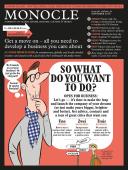
Issue 96
Get a move on – all you need to develop a business you care about. A 24-page Monocle guide for entrepreneurs, globally and locally minded creatives and anyone with a good idea who’s looking for the perfect home.
In This Issue
Oops! No content was found.
Looks like we no longer have content for the page you're on. Perhaps try a search?
Return Home

